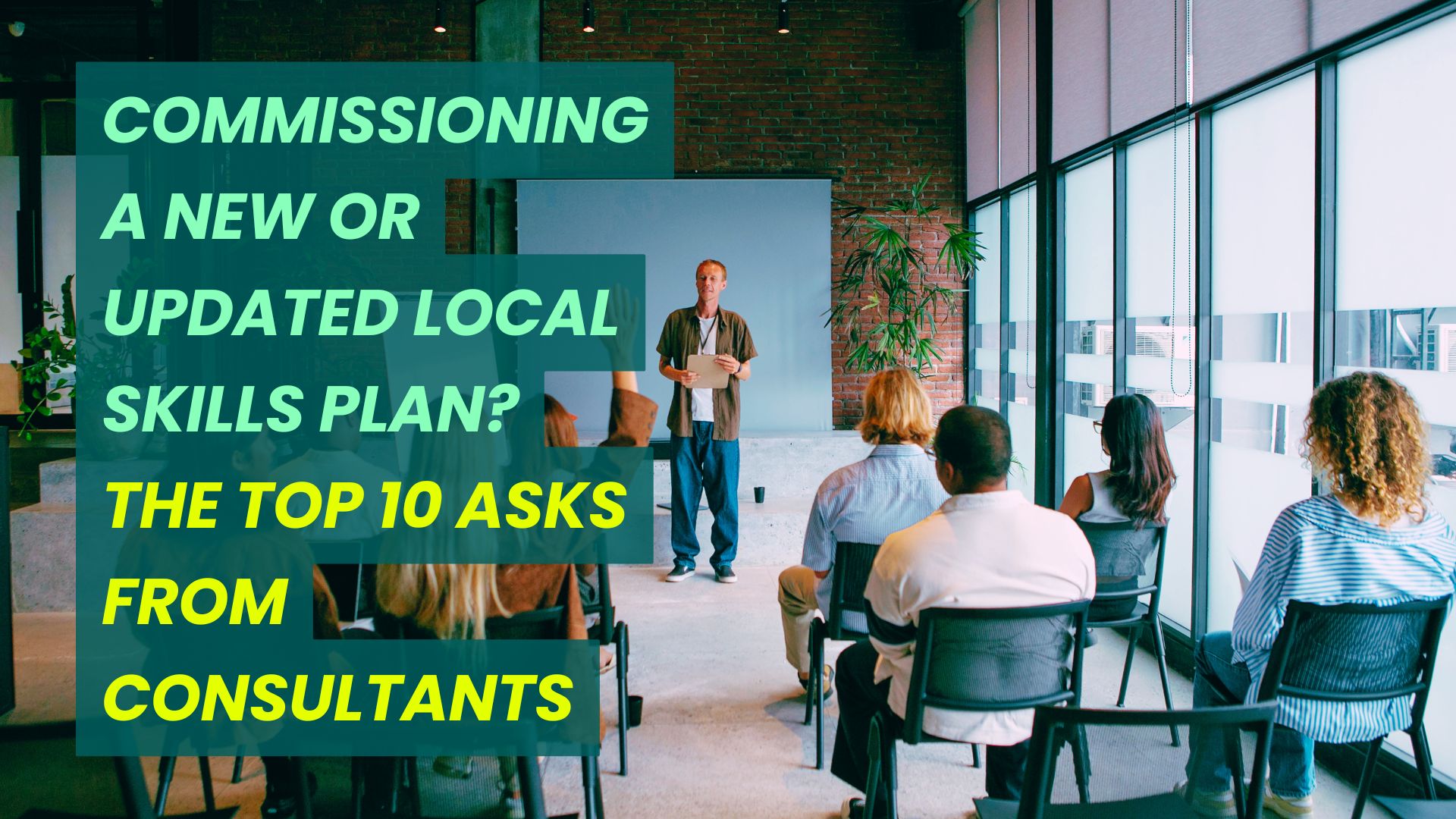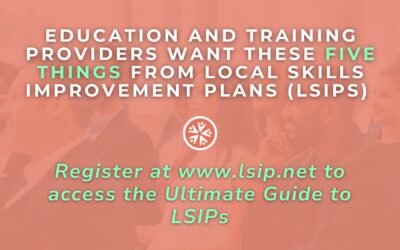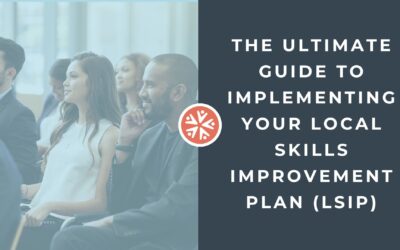𝟭 – 𝗗𝗲𝗺𝗼𝗻𝘀𝘁𝗿𝗮𝘁𝗲𝗱 𝗘𝘅𝗽𝗲𝗿𝘁𝗶𝘀𝗲 𝗮𝗻𝗱 𝗖𝗿𝗲𝗱𝗶𝗯𝗶𝗹𝗶𝘁𝘆: look for consultants with a proven track record (20+ years of applied experience) in labour markets, skills, and economics, ideally with senior roles in influential organizations.
𝟮 – 𝗘𝘃𝗶𝗱𝗲𝗻𝗰𝗲-𝗕𝗮𝘀𝗲𝗱 𝗮𝗻𝗱 𝗥𝗼𝗯𝘂𝘀𝘁 𝗔𝗻𝗮𝗹𝘆𝘀𝗶𝘀: the consultants must commit to delivering action-oriented, insightful, written with high impact – utilising robust data, cutting-edge analysis techniques (including Lightcast, Adzuna and The Data City).
𝟯 – 𝗜𝗻𝗻𝗼𝘃𝗮𝘁𝗶𝘃𝗲 𝗥𝗲𝘀𝗲𝗮𝗿𝗰𝗵 𝗠𝗲𝘁𝗵𝗼𝗱𝗼𝗹𝗼𝗴𝗶𝗲𝘀: seek consultants who propose a wide range of research methods beyond traditional surveys, such as sector-specific and cross-sector focus groups, one-to-one interviews, roundtable discussions, and roadshows.
𝟰 – 𝗙𝗼𝗿𝘄𝗮𝗿𝗱-𝗟𝗼𝗼𝗸𝗶𝗻𝗴 𝗮𝗻𝗱 𝗥𝗲𝘀𝗽𝗼𝗻𝘀𝗶𝘃𝗲 𝗥𝗲𝗰𝗼𝗺𝗺𝗲𝗻𝗱𝗮𝘁𝗶𝗼𝗻𝘀: the plan should not only identify current skills gaps but also anticipate future needs, especially in emerging sectors like low carbon and clean technology to help the region deliver training… now and in the future.
𝟱 – 𝗙𝗼𝗰𝘂𝘀 𝗼𝗻 𝗔𝗰𝘁𝗶𝗼𝗻𝗮𝗯𝗹𝗲 𝗦𝗼𝗹𝘂𝘁𝗶𝗼𝗻𝘀 𝗮𝗻𝗱 𝗥𝗼𝗮𝗱𝗺𝗮𝗽: the consultants must provide clear, implementable solutions and a roadmap for change delivery, and stress a series of practical but ambitious measures.
𝟲 – 𝗦𝘁𝗿𝗼𝗻𝗴 𝗦𝘁𝗮𝗸𝗲𝗵𝗼𝗹𝗱𝗲𝗿 𝗘𝗻𝗴𝗮𝗴𝗲𝗺𝗲𝗻𝘁 𝗦𝘁𝗿𝗮𝘁𝗲𝗴𝘆: a successful LSIP requires extensive engagement with employers, education and training providers, local authorities, and other relevant bodies. Consultants should demonstrate how they will foster meaningful and collaborative partnerships.
𝟳 – 𝗔𝗱𝗱𝗿𝗲𝘀𝘀𝗶𝗻𝗴 𝗖𝗿𝗼𝘀𝘀-𝗖𝘂𝘁𝘁𝗶𝗻𝗴 𝗮𝗻𝗱 𝗙𝗼𝘂𝗻𝗱𝗮𝘁𝗶𝗼𝗻𝗮𝗹 𝗦𝗸𝗶𝗹𝗹𝘀: beyond sector-specific needs, the plan must recognize the importance of cross-sector skills – including foundation skills, soft skills, behaviours and attitude, employability skills and higher-level skills.
𝟴 – 𝗨𝗻𝗱𝗲𝗿𝘀𝘁𝗮𝗻𝗱𝗶𝗻𝗴 𝗮𝗻𝗱 𝗜𝗺𝗽𝗿𝗼𝘃𝗶𝗻𝗴 𝗦𝘆𝘀𝘁𝗲𝗺 𝗡𝗮𝘃𝗶𝗴𝗮𝘁𝗶𝗼𝗻: consultants should identify and propose solutions to barriers businesses face in accessing training.
𝟵 – 𝗖𝗼𝗺𝗺𝗶𝘁𝗺𝗲𝗻𝘁 𝘁𝗼 𝗮 “𝗟𝗶𝘃𝗶𝗻𝗴 𝗗𝗼𝗰𝘂𝗺𝗲𝗻𝘁” 𝗔𝗽𝗽𝗿𝗼𝗮𝗰𝗵: The plan should be seen as the “start of this journey” rather than a one-off exercise, with mechanisms for ongoing engagement and continuous improvement.
𝟭𝟬 – 𝗔𝗯𝗶𝗹𝗶𝘁𝘆 𝘁𝗼 𝗦𝗲𝗰𝘂𝗿𝗲 𝗛𝗶𝗴𝗵 𝗥𝗲𝘀𝗽𝗼𝗻𝘀𝗲 𝗥𝗮𝘁𝗲𝘀 𝗮𝗻𝗱 𝗗𝗶𝘃𝗲𝗿𝘀𝗲 𝗕𝘂𝘀𝗶𝗻𝗲𝘀𝘀 𝗘𝗻𝗴𝗮𝗴𝗲𝗺𝗲𝗻𝘁: ask consultants to outline specific strategies to achieve great survey and consultation response rates.
See our LSIP Ultimate Guide for more tips at https://lsip.net/ultimateguide/








